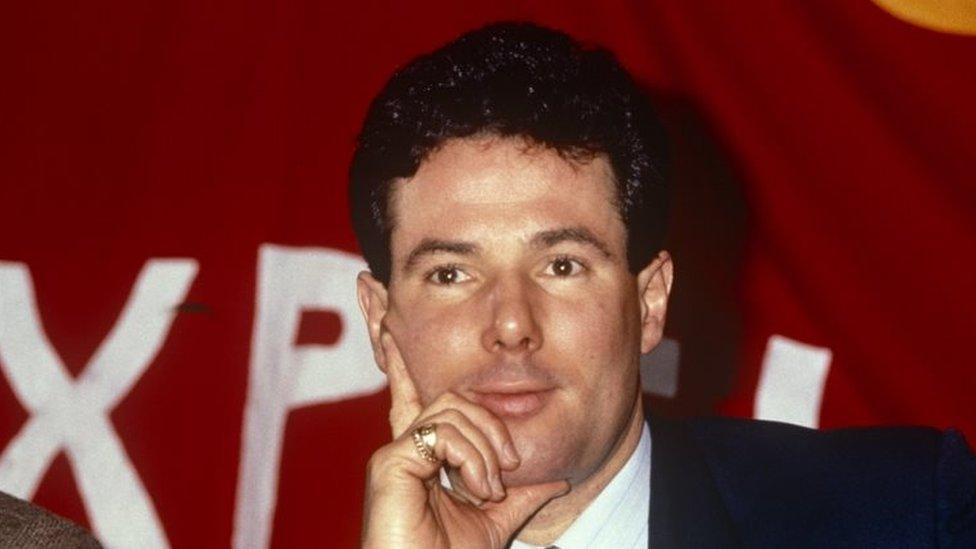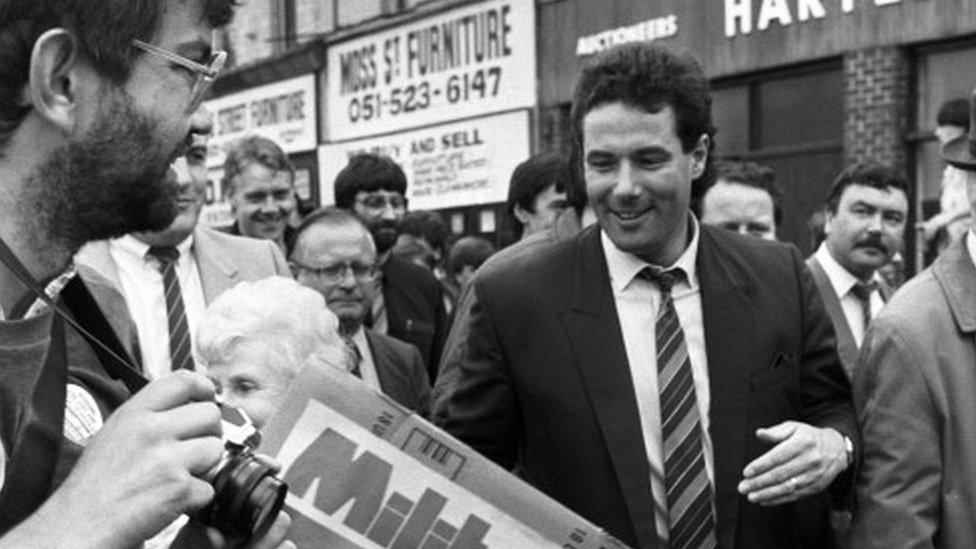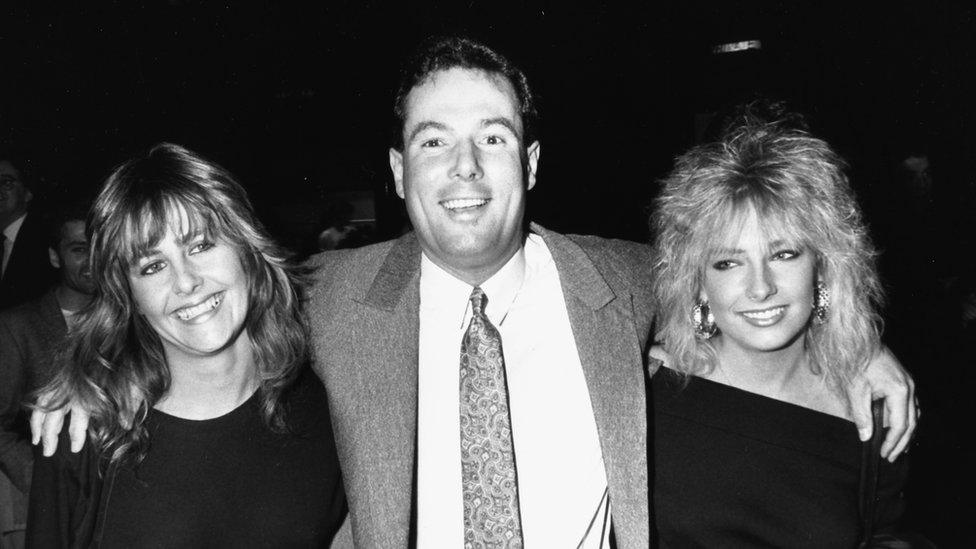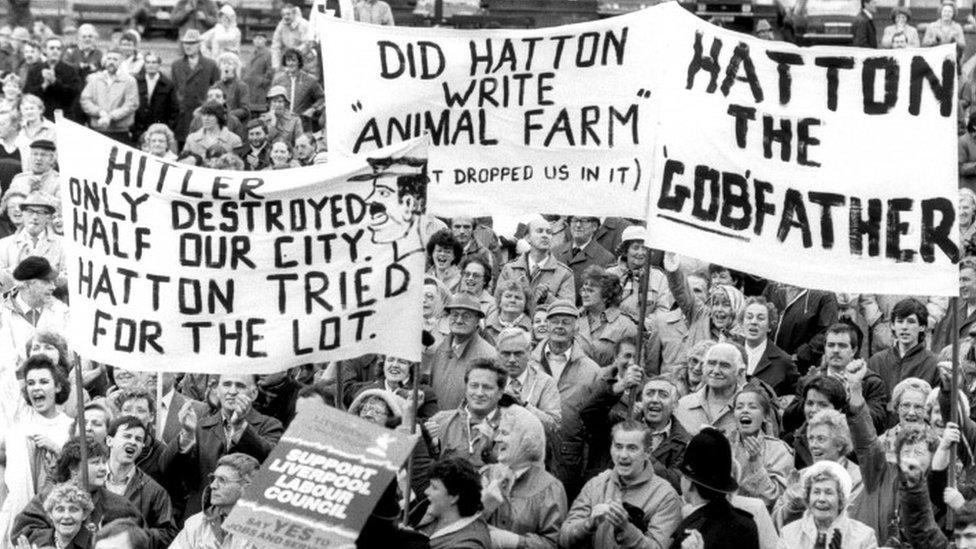Who is Derek Hatton?
- Published

For anyone under the age of 40, the name Derek Hatton will probably not mean much - so why has the news that he has rejoined the Labour Party provoked so much comment?
Mr Hatton's expulsion from Labour in 1986 was seen as the defining moment in then leader Neil Kinnock's efforts to purge the party of the "hard left".
It was a stepping stone towards the creation of Tony Blair's New Labour - and the banishing of Jeremy Corbyn, John McDonnell and others on the left of the party to Labour's margins for three decades.
A brash, voluble Scouser, with a taste for Armani-suits, Mr Hatton became a national figure as deputy leader of Liverpool City Council, which defied the Thatcher government's cuts to local government by setting an illegal budget.
But it was his role as a leading figure in the Militant tendency that made him such a bogey figure for the so-called moderate wing of the party - and a hero to the left.
Militant had grown out of the Revolutionary Socialist League - one of a bewildering number of tiny communist parties to have emerged from the radical student movement of the 1960s.

Derek Hatton joins supporters on a demonstration in support of Liverpool Council in 1985
It was widely categorised as Trotskyist - the Marxist philosophy of "international socialism" developed by Leon Trotsky, one of the founders of the Soviet Union.
And it was initially a clandestine organisation, with potential recruits being approached individually and invited to attend secret meetings.
It drew much of its support from young people hungry for social change and disillusioned with what they saw as Labour's watered-down version of socialism - they believed capitalism was beyond reform and the only answer was to nationalise private industry without compensation.
From the mid-1970s, Militant's critics claimed it pursued an "entryist" policy of attempting to gain key positions within the Labour Party in an effort to promote its policies. They claimed it was operating as a "party within a party", something always denied by its supporters.
The rallying point for supporters was the Militant newspaper.

Celebrity politician: Derek Hatton at a film premiere in 1988
Supporters of Militant underwent intensive training in Trotskyist ideology and were known for their highly disciplined approach to politics and their willingness to make personal sacrifices for the cause.
At its height, Militant is thought to have had about 8,000 supporters.
Militant's most notable success was in Liverpool, where the local Labour Party - dominated by Militant members - took control of the city council in 1983. Despite being only deputy leader, Mr Hatton was seen as effectively in charge.
Liverpool was particularly receptive to Militant's ideas because it had suffered a steep decline in heavy industry, and traffic at its port, sending unemployment and deprivation in the city soaring.
Militant vehemently opposed the Conservative government of Margaret Thatcher, attempting to resist a reduction in the city's grant from central government by setting an illegal budget that allowed for more spending than there was income.
Supporters of Militant point to the wave of building it initiated in Liverpool, replacing slum housing and improving sports and other leisure facilities.

A 1986 anti-Militant demonstration in Liverpool
But the council did not have enough money to pay for its programme and action by the district auditor was averted only by taking out loans. A move to apparently issue redundancy notices to every single council employee - ostensibly as a negotiating tactic - was widely criticised.
And the then Labour leader, Neil Kinnock, used a conference speech to attack Militant for "the grotesque chaos of a Labour council hiring taxis to scuttle round a city handing out redundancy notices to its own workers".
In June 1986, Mr Hatton was expelled from the Labour Party after a disciplinary hearing. A number of other politicians and activists were also thrown out and Militant was banned by the party.
Some saw this as an overreaction, including Jeremy Corbyn, who accused the party leadership of carrying out a witch-hunt against alleged Militant infiltrators.
"There's an atmosphere of Star Chamber surrounding this whole thing. It's a scandalous miscarriage of justice," said Mr Corbyn after a Labour Party branch in Bermondsey was suspended by Neil Kinnock.
Several leading figures from Militant have attempted to rejoin the Labour Party since Mr Corbyn was elected leader.
These include Peter Taaffe, who now leads The Socialist Party, the successor to Militant, but they have largely been rebuffed because they are members of other parties, something that is not allowed under Labour rules.
Mr Hatton, now 71, who has pursued careers in property development, broadcasting and public speaking since being pushed out of politics, has also been attempting to rejoin the Labour Party for some time.
This week he told BBC News his membership had been approved, although Labour said it could not comment on individual applications.
He told BBC Radio 4's Today programme: "It's good to be back.
"In a way, I've never left. For 34 years, I have stayed absolutely solid with the Labour Party."
He said he has no ambitions to seek elected office again but was "probably more excited about the future" than he had ever been.